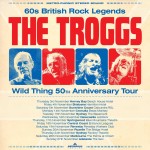What Makes Poison Ivy Rorschach a Punk Music Icon?
Poison Ivy Rorschach may have retired her six-string, but she is remembered fondly by generations of early punk music lovers. The Poison Ivy musical legacy is one to marvel at, especially considering the relatively low penetration of female rock musicians during her heyday.
Today at Jukebox Saturday Night, we take a look back at The Cramps’ enigmatic lead guitarist and how her influence left an indelible mark on the industry.
1. Pioneer of female punk rock representation
Poison Ivy’s musical influences
Before she rose to fame as a member of The Cramps, Poison Ivy Rorschach found inspiration in Bo Diddley’s Sacramento Live performance. But it wasn’t Diddley who caught her eye – she was actually admiring The Duchess, his female guitarist. This encounter sparked her musical ambitions and led her to initially emulate The Duchess’s style.
Eventually, however, Poison Ivy Rorschach career history would become iconic in its own right. Though Poison Ivy Rorschach influences included male greats like Duane Eddy, Ike Turner, and Link Wray, it was that first sight of The Duchess that signalling that she, too, could pursue her rock dreams. Ivy moved on to become an influential music figure herself, paving the way for female representation in punk rock.
Subversive and playful
‘The Cramps’ – Ivy’s idea – is actually a nod to menstrual cramps, and it represents the band’s bold approach to challenging traditionally negative or even derogatory terms associated with femininity.
For one, the Poison Ivy stage persona and name also carry subversive undertones, referencing the Coasters’ song ‘Poison Ivy’, which was a metaphor for venereal disease. This reclamation of negative connotations highlights Ivy’s fearless attitude and her redefinition of gender narratives in punk music at the time.
Embracing sexuality and womanhood
As a former dominatrix and punk rock icon, Poison Ivy Rorschach embraced her sexuality unapologetically. This remained even as she took to the stage as one-half of the Cramps’ core duo – the other half, of course, being her husband, the lead vocalist Lux Interior, who is now in R’n’R Heaven.
Her fashion choices, which ranged from latex and pin-up costumes to revealing bustier tops, were statements of defiance and expressions of the darker aspects of pop culture.
Ivy’s aesthetic choices, paired with her musical prowess, challenged conventional stereotypes and underscored the multifaceted nature of womanhood in the punk rock scene.
2. Distinct musical style
Poison Ivy Rorschach guitar style was decidedly animal-like; she complemented Interior’s highly distinctive vocal stylings by making her guitar mew, buzz, and weep. Equipment-wise, her various guitar choices significantly defined her sound and, by extension, the sonic identity of The Cramps.
Initially wielding a solid body Bill Lewis guitar, Ivy transitioned to a 1958 Gibson 6129 hollow body, which she favoured for its rich, resonant tones. This guitar, with its deeper sound, became iconic in her performances and was a staple in the early psychobilly scene.
Despite later shifting to a 1958 Gretsch 6120, which is supposedly notorious around the web for its tuning instability, she reported never struggling with the guitar, claiming that she had a personal relationship with her beloved instrument.
Reinvention of rockabilly and music norms
The Cramps didn’t just play rockabilly; they twisted it into something entirely their own. By infusing elements of trash rock from forgotten 70s bands and psychedelic sounds into tracks like ‘I Was a Teenage Werewolf’ and ‘Goo Goo Muck’, Poison Ivy Rorschach and her bandmates reshaped what rockabilly could be.
The younger ones may recognise ‘Goo Goo Muck’ from its recent moment of virality on the Netflix series ‘Wednesday’. The Cramps’ version of the song, originally by Ronnie Cook and the Gaylads, took a relatively overlooked track and reimagined it with a raw, aggressive edge.
The Cramps also reworked ‘The Crusher’, a 1940s song by The Novas, adding lyrics that intensified the song’s narrative and showcasing their ability to blend tradition with audacious innovation. These Poison Ivy Rorschach songs weren’t simply covers; they were fresh and new takes on the tracks, which is why they often sounded like completely new songs.
3. Onstage and offstage professionalism
Business acumen and financial oversight
In the chaotic world of rock ‘n’ roll, Poison Ivy Rorschach stood out not just for her musical prowess but also for her sharpness and clearheadedness, which cemented her as the de facto leader of the band. Rather than rely on external managers who had previously let them down, Ivy took the reins of managing The Cramps.
Her diligence in overseeing the financial aspects ensured the band’s longevity and integrity. Lux Interior once praised her, saying, ‘She really does it [management] great…that’s why the Cramps are still around after all this time, because she cares about it and she’s capable of unbelievable acts’.
Ivy’s proactive approach to the band’s business affairs, like meticulously checking the books after gigs to make sure they weren’t getting ripped off, proved essential in navigating the often-turbulent music industry.
Musical technical prowess and professionalism
Onstage, the dynamic was electric and somewhat unconventional; while Lux Interior delivered performances that often ended with him naked, Poison Ivy Rorschach orchestrated the real show from the sidelines.
Not only did she manage the band and produce their music, but she was also the backbone during live performances. Ivy frequently assisted her bandmates, like Bryan Gregory and Kid Congo Powers, who were more visually than musically inclined.
Gregory, for example, was often unable to tune his own guitar, according to Ivy’s account. He was said to have relied on Ivy’s expertise even while on stage. When bandmates wouldn’t show up to recording sessions, Ivy would fill in for them in the studio.
Despite arguably receiving less credit for her work, Poison Ivy Rorschach’s role extended beyond the spotlight, ensuring that every strum and note played was up to her exacting standards, often compensating for the shortcomings of her less reliable bandmates.
Frequently Asked Questions (FAQ)
What genre of music is Poison Ivy Rorschach known for?
The Poison Ivy Rorschach music identity is deeply entrenched in the psychobilly genre, which you could call a hybrid of punk rock’s raw, volatile energy and rockabilly’s rhythmic allure. Alongside The Cramps, she was instrumental in carving out this niche. The result? A distinct and enduring sound that continues to influence bands within these genres.
What instruments does Poison Ivy Rorschach play?
While she was known for her rhythmic guitar playing and nonchalant, devil-may-care stage presence, Poison Ivy’s musicianship actually enabled her to wear multiple hats.
She was the band’s first bassist before she settled into her role as the rhythm guitarist. Her guitar work, characterised by its steady and imposing presence, anchored the band’s music, giving it a gritty, pulsating foundation that complemented their eccentric style.
Has Poison Ivy Rorschach collaborated with other musicians?
The Cramps weren’t known to collaborate frequently with others on official tracks, but throughout Ivy’s career with the band, she had the chance to make music with a few other artists. Some noteworthy collaborations include teaming up with Wanda Jackson on ‘Funnel of Love’ and Iggy Pop on ‘Miniskirt Blues’.
Relive the glory days of music on Jukebox Saturday Night
Jukebox Saturday Night (JBSN) is a tribute to the enduring spirit of rock ‘n’ roll. Founded by Ken Sparkes and his friends, JBSN started as a small project fueled by a profound love for music.
This passion project has grown tremendously, driven by the goal of keeping real rock ‘n’ roll alive on our screens and in our hearts. After Ken’s untimely passing in 2016, his family stepped in to honour his legacy, ensuring that the show not only continues but thrives.
Our programme has become a beacon for those who cherish the roots of rock music, providing not just entertainment but a community for like-minded enthusiasts such as fans of the Little River Band members, Ricky Wilson (guitarist), the iconic John Lennon Yoko Ono duo, and more. Ken’s voice may have faded away, but his vision echoes louder than ever.
At Jukebox Saturday Night, we are custodians of a musical heritage. In every broadcast, we want to convey the sheer joy of rock ‘n’ roll, and we invite you all to join us in keeping the rhythm alive.




